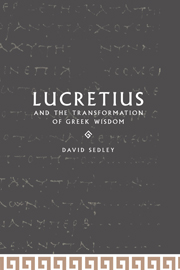
-
Select format
-
- Publisher:
- Cambridge University Press
- Publication date:
- September 2009
- October 1998
- ISBN:
- 9780511482380
- 9780521570329
- 9780521542142
- Dimensions:
- (228 x 152 mm)
- Weight & Pages:
- 0.55kg, 256 Pages
- Dimensions:
- (228 x 152 mm)
- Weight & Pages:
- 0.386kg, 256 Pages
You may already have access via personal or institutional login
Book description
This book is designed to appeal both to those interested in Roman poetry and to specialists in ancient philosophy. In it David Sedley explores Lucretius' complex relationship with Greek culture, in particular with Empedocles, whose poetry was the model for his own, with Epicurus, the source of his philosophical inspiration, and with the Greek language itself. He includes a detailed reconstruction of Epicurus' great treatise On Nature, and seeks to show how Lucretius worked with this as his sole philosophical source, but gradually emancipated himself from its structure, transforming its raw contents into something radically new. By pursuing these themes, the book uncovers many unrecognised aspects of Lucretius' methods and achievements as a poetic craftsman.
Reviews
‘[this] may be recommended unreservedly as a major contribution to the understanding of Lucretius’ poetics, [and] must become required reading for all students of Lucretius … [It is] one of the most stimulating works on Lucretius for many years.’
Source: Bryn Mawr Classical Review
‘This is a very rich book, a milestone in Lucretian scholarship and without any doubt a major point of reference for future Lucretian studies.’
Source: Phronesis
‘Lucretius and the Transformation of Greek Wisdom recommends itself for its overall wealth of detail, as well as for its engaging reconstruction of the relationship between the poems of Lucretius and that of Empedocles … ’
Source: The Times Literary Supplement
'… fascinating … S gives us a lot of excellent insights into many aspects of the poem … will continue to provoke healthy critical debate and is already required reading in university courses on Lucretius. It is not afraid to raise big questions about Lucretius … scrupulous accuracy and apparently effortless readability … his opinions, and the light his arguments shed on the detail of the poem and its background, cannot be ignored by any serious student - or teacher- of this poem.'
Source: The Journal of Classics Teaching
Contents
Metrics
Altmetric attention score
Full text views
Full text views help Loading metrics...
Loading metrics...
* Views captured on Cambridge Core between #date#. This data will be updated every 24 hours.
Usage data cannot currently be displayed.
Accessibility standard: Unknown
Why this information is here
This section outlines the accessibility features of this content - including support for screen readers, full keyboard navigation and high-contrast display options. This may not be relevant for you.
Accessibility Information
Accessibility compliance for the PDF of this book is currently unknown and may be updated in the future.


